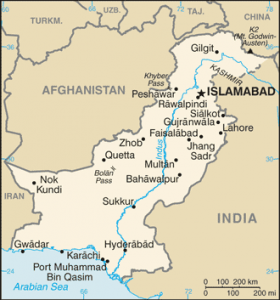The Centers for Disease Control and Prevention (CDC) updated their travel notice for Pakistan and the outbreak of extensively drug-resistant (XDR) typhoid fever this week.
The ongoing outbreak began in 2016 in Sindh province, Pakistan, and spread throughout the country.
Cases of XDR typhoid fever have been reported among people in North America, Europe, East Asian, and the South Pacific who traveled to Pakistan.
All travelers to Pakistan are at risk of getting XDR typhoid fever, they report.
As of January 14, 2021, CDC has received 71 reports of XDR Typhi infection in the United States, with specimens obtained from February 9, 2018, through November 16, 2020. Among 67 patients with known travel history, 58 (87%) had traveled to Pakistan in the 30 days before illness began.
Nine (13%) patients from six states (NY [3], CA [2], IL, MD, NJ, and TX) reported that they had not traveled to Pakistan or any other country. Specimens from these nine patients were obtained from November 7, 2019, through October 7, 2020, with eight obtained in 2020. Susceptibility testing of these specimens showed the same resistance pattern described in Pakistan. CDC has not identified linkages among these patients or a common source of infection.
XDR Typhi strains are resistant to antibiotics generally recommended to treat typhoid fever, including ampicillin, ceftriaxone, chloramphenicol, ciprofloxacin, and trimethoprim-sulfamethoxazole. Isolates from patients linked to the outbreak in Pakistan are susceptible to carbapenems and azithromycin.
What can travelers do to prevent typhoid fever?
Get the typhoid vaccine

CDC recommends that all travelers (even short-term travelers) to Pakistan and South Asia be vaccinated against typhoid fever before travel. Visit a doctor or travel clinic to discuss options. Two typhoid fever vaccines have been approved for use in the United States.
- An injectable vaccine (approved for people aged 2 and older): given as a shot at least 2 weeks before travel
- An oral vaccine (approved for people aged 6 and older): a total of four capsules taken by mouth (one every other day), finishing at least one week before travel
Because the maker of the oral vaccine temporarily stopped its production in December 2020, it may not be available to travelers. If the oral vaccine is not available, travelers aged 2 and older should get the injectable vaccine.
Always practice safe eating and drinking habits
The bacteria that cause typhoid fever are most often spread through contaminated food and water and person to person contact. Because typhoid fever vaccines are not 100% effective, travelers should always practice safe eating and drinking habits to help prevent infection.
- Follow safe food and water guidelines.
- Wash your hands often, especially before eating.
- Avoid eating food prepared by anyone who is sick or has recently been sick.
Typhoid fever is a serious disease caused by Salmonella Typhi (Typhi) bacteria. The bacteria spread through contaminated food and water and person-to-person contact.
Symptoms of typhoid fever include high fever, weakness, stomach pain, headache, constipation or diarrhea, cough, and loss of appetite. Typhoid fever can be fatal without appropriate antibiotic treatment.
http://outbreaknewstoday.com/cdc-all-travelers-to-pakistan-are-at-risk-of-getting-xdr-typhoid-fever-38406/

No comments:
Post a Comment